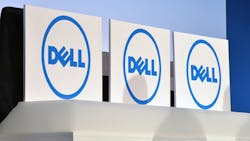Dell Shareholders Approve Deal To Take Company Private
NEW YORK -- Shareholders of Dell today approved a proposal led by company founder Michael Dell to take the company private as it attempts to navigate a fast-changing technology market.
The proposal, worth about $25 billion, won an unspecified majority of votes from the holders of Dell stock, the company said in a statement.
The buyers consortium sweetened the deal in recent weeks in response to criticism from activist Carl Icahn and others, who had complained that their offer undervalued the company.
The deal comes against a backdrop of profound change in the technology sector with the rise of mobile technology and clears the way for Michael Dell and partner investment firm Silver Lake to transform the company away from the glare of public markets and the need to wow investors with great quarterly results.
"I am pleased with this outcome and am energized to continue building Dell into the industry's leading provider of scalable, end-to-end technology solutions," Michael Dell said.
Details of the Deal
Under the terms of the transaction, Dell shareholders will receive $13.75 in cash for each share of Dell common stock, plus a special cash dividend of 13 cents per share. The total transaction is valued at about $24.9 billion.
Dell shares at midday were up 1 cent (0.1%) at $13.86.
The buyers improved their offer in August, adding at least $350 million in exchange for a modification to the shareholder voting system so that only votes cast would be counted. Previously nonvoting shares would have been counted against the buyout.
Icahn on Monday continued to criticize the proposal as undervaluing the company, but signalled an end to his campaign to derail the merger in light of the change to the voting system.
Technology Earthquake
The transaction comes amid a seismic shift in the technology sector with the rise of smart phones, tablets and other mobile devices at the expense of the once-mightly personal computer market.
Michael Dell created the company from his dorm room at the University of Texas and grew the Round Rock, Texas-based firm into a global heavyweight known for direct service to customers and cutting out the retail middle man.
But Dell, once the world's biggest PC seller, has fallen behind rivals Lenovo and Hewlett-Packard and faces pressure because of slumping computer sales. A recent survey showed worldwide sales of personal computers dropped for a fifth consecutive quarter in the April-June period.
Those diminishing PC sales have led to seven straight quarters of declining profits. And the special committee established to consider Dell's strategic options gave a bleak outlook for the future of the PC market.
Analysts say Dell must implement some radical changes to bolster its presence in the software and services businesses to make up for declining PCs.
Dell's Post-Deal Plans
A Dell securities filing earlier this year said the post-deal Dell would aim to invest significantly in research and development to bolster information technology services in such areas as cloud solutions, software and managed security services.
The company also said it plans to hire additional sales personnel, compete aggressively in emerging countries and invest for growth in the PC and tablet industries.
Dell said it was necessary to become private because executing the changes "would require at least three to five years to reach fruition and would require additional investments that could weaken earnings for two or more years and increase pressure on the company's stock price."
"It's a very risky situation for Dell," said Roger Kay, analyst at Endpoint Technologies Associates.
Kay said Dell will have difficulty reshaping the company but that "they now have permission to shift the focus of the enterprise more rapidly."
Dell said it expects the merger to close before the end of its fiscal third quarter, which is at the end of October.
John Biers, AFP
Copyright Agence France-Presse, 2013
About the Author
Agence France-Presse
Copyright Agence France-Presse, 2002-2025. AFP text, photos, graphics and logos shall not be reproduced, published, broadcast, rewritten for broadcast or publication or redistributed directly or indirectly in any medium. AFP shall not be held liable for any delays, inaccuracies, errors or omissions in any AFP content, or for any actions taken in consequence.
